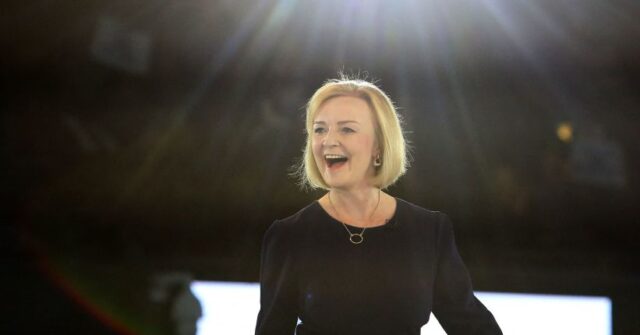

Liz Truss is the new leader of Britain’s ruling political party, the Conservatives, and will become Prime Minister tomorrow.
The marathon-length process to replace Boris Johnson as Conservative leader and, by extension, Prime Minister of the United Kingdom is almost at an end, with Liz Truss duly elected to replace him on Monday afternoon. Speaking to colleagues at a specially convened meeting at Queen Elizabeth II Hall in Westminster, the party officer responsible for Conservative leadership challenges and elections Sir Graham Brady revealed that Liz Truss had bested rival Rishi Sunak in the race to replace Boris Johnson.
Only paid-up members of the Conservative Party were eligible to vote.
Sunak — 60,399 votes (42.6%)
Truss — 81,325 votes (57.3%)
82.6% votes cast out of 172,437 eligible
Mary Elizabeth ‘Liz’ Truss, who is 47 years old, is now the leader of Britain’s largest political party, which means, because the United Kingdom has a Parliamentary rather than Presidential system, that she will now also become Prime Minister. The normally quick constitutional element of that process, which involves the outgoing leader meeting with the Queen to resign and the newcomer then taking on the role, is being delayed until Tuesday.
The Queen, 96, would normally travel to London to undertake her part in this important constitutional process, however her health means she will stay at her home in Scotland: both Boris Johnson and Liz Truss will travel for the meeting tomorrow, after which Truss will begin to assemble her government and lay out governing priorities. While many promises have been made and ideas mooted during the campaign, what she makes time to reiterate in the coming hours and days may be indicative of the future direction of travel, even if Conservative leaders traditionally have an extremely poor track record of keeping promises.
‘A Dreadful Mistake’: Nigel Farage Warns UK is Sleepwalking into ‘Theresa May 2.0’https://t.co/MuroC9yXyX
— Breitbart London (@BreitbartLondon) July 19, 2022
Truss becoming party leader today, and Prime Minister tomorrow, marks the end of a mammoth leadership challenge and replacement process, which could have been conducted in days or weeks but instead has dragged out for months. While the internal machinations of the Conservative party may not normally be of interest to many, the super-length process has left the country effectively leaderless during a time of mounting crisis, with Boris Johnson unwilling or uninterested in making major decisions ahead of his departure.
While Johnson won a historic election victory in 2019, taking a powerful governing majority in a parliament that had spent a decade destabilised by wafer-thin and even negative majorities, what had the potential to be a reforming government was quickly derailed. Johnson’s big promises on Brexit were revealed to be hollow, with the Prime Minister delivering a reheated version of Theresa May’s unpopular half-house Brexit that he had once roundly criticised.
Johnson has traded since on credit for actually delivering a Brexit, but among dedicated Brexiteers this praise is typically qualified with notes that Brexit is still a work in progress and fraught with problems caused by poorly conducted negotiations.
Indeed, the government is now attempting to renegotiate the bad Brexit deal which Johnson signed up to.
Yet the worst was to come with the coronavirus era, which the Boris government responded to by initially doing nothing at all, at a time where closing down access to travellers from coronavirus hotspots like China and Italy could conceivably have helped slow the initial rush of the virus, before launching suddenly into one of the harshest and most damaging lockdowns in the world.
Race for UK PM: Tax-Hiking Sunak Pledges Lower Taxes, Pro-Borders Truss Pledges More Migrants https://t.co/ISIzyuMGbP
— Breitbart London (@BreitbartLondon) August 1, 2022
While many appeared to enjoy being coerced into major behavioural change by the state, it was the constantly changing web of rules and regulations, which became more complex and byzantine with each passing day, that would herald the beginning of the end for Johnson’s leadership. Caught breaking the lockdown rules he helped create, enforce, and enthusiastically appeared on television to promote daily, Johnson’s credibility was rocked.
A leadership challenge followed inside Parliament in June, but with a powerful guard of loyal members Johnson was able to survive the vote. Yet as with other Conservative leaders before him — Margaret Thatcher survived a leadership challenge in 1990 but still quit days later — the damage was done, and more revelations about Johnson having knowingly promoted a known sex pest was more than enough to precipitate his resignation on July 7th.
That was two months ago. Rather than moving quickly to replace Johnson, the Conservatives lurched into a lengthy leadership process, which even the people responsible for organising it would likely now admit has gone on far too long and may have further damaged the party in the public eye.
The process started with daily knockout rounds in which only MPs could vote, reducing the initial field of a dozen down to two, Truss and Sunak, making sure any candidates who proposed a serious change in direction from the Johnson years were eliminated. Ironically, having gotten rid of Johnson, the Conservative Party decided it wanted more of the same.
Having concluded the party insider phase, the vote was then opened to the broader party, of which there are around 180,000 members nationwide. Polls have favoured Truss over Sunak, who was the favourite candidate of the MPs, since the start, and the extra-long polling time has seen both candidates slow their campaigns against each other, presumably to reduce the impression of Conservative infighting to the public.
Truss does not now have long to make an impact with her government and ingratiate herself with the wider public voting public. The next British general election is only a little more than two years away now, and the country appears to be all but certain to be entering a period of damaging energy shortages and crippling inflation.
Truss insists she has a plan to defeat these menaces, and whether her party wins a historic further election win in 2024, or hands the reins of power to left-wing Labour will likely depend on her success in that.
Boris May Be Going, But Britain Is Years Away From Getting the Political Class It Deserveshttps://t.co/Z1tDWagmQ4
— Breitbart London (@BreitbartLondon) July 7, 2022





